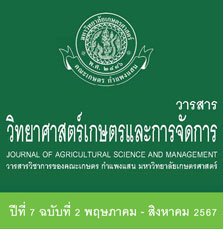ผลของการลดความชื้นแบบยิ่งยวดและความเข้มข้นออกซิเจนในบรรยากาศต่อคุณภาพเมล็ดพันธุ์พริกหลังการเก็บรักษา
คำสำคัญ:
อายุเก็บรักษา, ความแข็งแรง, ลิปิดเปอร์ออกซิเดชั่น, การเสื่อมของเยื่อหุ้มเซลล์บทคัดย่อ
การวิจัยครั้งนี้มีวัตถุประสงค์เพื่อหาวิธีการเก็บรักษาเมล็ดพันธุ์พริกที่ประหยัดพลังงาน โดยอาศัยการลดความชื้นแบบต่ำยิ่งยวดและความเข้มข้นออกซิเจนในบรรยากาศที่ต่ำ วางแผนการทดลองแบบ 4 x 2 factorial in completely randomized design จำนวน 4 ซ้ำ ปัจจัย A คือ ความชื้นเมล็ดพันธุ์ 4 ระดับ (8, 6, 4, และ 2 เปอร์เซ็นต์โดยน้ำหนักสด) และปัจจัย B คือ ระดับความเข้มข้นออกซิเจนในอากาศ 2 ระดับ (10 เปอร์เซ็นต์ และ 21เปอร์เซ็นต์) นำเมล็ดพันธุ์พริกพันธุ์ TVRC 365 จากศูนย์วิจัยและพัฒนาพืชผักเขตร้อน มหาวิทยาลัยเกษตรศาสตร์ ที่มีเปอร์เซ็นต์ความงอกที่ 96.5 เปอร์เซ็นต์ และความชื้น 8 เปอร์เซ็นต์ มาลดความชื้นแบบยิ่งยวดให้เหลือ 8, 6 , 4 และ 2 เปอร์เซ็นต์ โดยการบ่มในสารละลายเกลืออิ่มตัว ก่อนนำไปใส่ในโหลแก้วที่มีก๊าซออกซิเจนที่ระดับ 10 และ 21 เปอร์เซ็นต์ เก็บรักษาในตู้ทำความเย็นตั้งอุณหภูมิที่ 25 องศาเซลเซียส พบว่า หลังจากเก็บรักษานาน 10 เดือน เปอร์เซ็นต์ความงอกในห้องปฎิบัติการ ในโรงเรือน และหลัง CD test กิจกรรมเอนไซม์ superoxide dismutase และ catalase ที่มีค่าสูงที่สุด และปริมาณการรั่วไหลของผนังเซลล์ สาร malondialdehyde และhydrogen peroxide ที่มีค่าต่ำที่สุด พบในเมล็ดพันธุ์ที่มีความชื้น 2 เปอร์เซ็นต์ เก็บรักษาในบรรยากาศที่มีออกซิเจน 21เปอร์เซ็นต์ และในเมล็ดพันธุ์ที่มีความชื้น 4 เปอร์เซ็นต์ เก็บรักษาในบรรยากาศที่มีออกซิเจน 10 เปอร์เซ็นต์ ผลการศึกษาเสนอศักยภาพในการเก็บรักษาเมล็ดพันธุ์พริกแบบประหยัดพลังงานไฟฟ้าที่อุณหภูมิห้อง 25 องศาเซลเซียส
เอกสารอ้างอิง
กรมวิชาการเกษตร. 2566. การส่งออกเมล็ดพันธุ์ควบคุม (รายชนิด) (ระบบออนไลน์).แหล่งข้อมูล: https://data.go.th/dataset/exportplantitem (18 กรกฎาคม 2566).
วันชัย จันทร์ประเสริฐ. 2538. สรีรวิทยาเมล็ดพันธุ์. สำนักพิมพ์มหาวิทยาลัยเกษตรศาสตร์. กรุงเทพฯ 213 หน้า
สุชีลา เตชะวงค์เสถียร. 2548. การพัฒนาพันธุ์พริกขี้หนูหอม. หนังสือพิมพ์และนิตยสารในเครือมติชน. สำนักงานเศรษฐกิจการเกษตร. 2559. การใช้ที่ดินในด้านการเกษตร ปี 2559. (ระบบออนไลน์).แหล่งข้อมูล: http://www.oae.go.th/ewt_news.php?nid=151 (20 มกราคม 2562).
Bailly C. and I. Kranner. 2011. Analyses of reactive oxygen species and antioxidants in relation to seed longevity and germination. Methods in Molecular Biology 773: 343–367.
Bailly, C., H. El-Maarouf-Bouteau and F. Corbineau. 2008. From intracellular signaling networks to cell death: the dual role of reactive oxygen species in seed physiology. Comptes Rendus Biologies 311: 806-814.
Basak, O., I. Demir, K. Mavi and S. Matthews. 2006. Controlled deterioration test for predicting seedling emergence and longevity of pepper (Capsicum annuum L.) seed lot. Seed Science and Technology 34(3): 701–712.
Du, j., Y. Wen, E. Yang, J. Duan, X. Liu, L. Zhang, F. Zhao and C. Xiang. 2019. pp.108-113. In: Advances in ultra-dry seed storage. 2019 International Symposium on Agriculture, Food and Biotechnology.
Greenspan L. 1977. Humidity fixed points of binary saturated aqueous solutions. Journal of Research of the Nnational Bureau of standards-A Physics and Chemistry 81: 89-96.
Groot, S.P.C., A. Surki, R.C. de Vos and J. Kodde. 2012. Seed storage at elevated partial pressure of oxygen, a fast method for analyzing seed ageing under dry conditions. Annals of Botany 110: 1149–1159.
Harrington, J.F. 1972. Seed storage and longevity. pp.145–245. In Kozlowski, T.T., Seed Biology 3:145-245, illus. New York and London.
ISTA. 2019. International Rules for Seed Testing Edition 2012. International Seed Testing Association (ISTA), CH-Switzerland. 163 P.
Kittiwatchana, W., W. Imsabai, S. Chanprame and T. Thongket. 2021. Effects of drying rates on quality of Thai hot-chili (Capsicum annuum L.) seed after priming. Agriculture and Natural Resource 55: 863–872.
Li, Y., J. Qu, W. Zhang, L. An, P. Xu and Y. Li. 2010. Impact of ultra-dry storage on vigor capacity and antioxidant enzyme activities in seed Ammopiptanthus mangolica. Botanical Studies 51: 465-472.
Matkovich, B., O. Gašić, Sz.I. Varga, D. Štajner and M. Kraljević-Balalić. 1989. The antioxidant enzyme activities in wheat seeds and their F1 hybrids. Cereal Research Communication 17: 113-119.
McCormack, J.H. 2004. Seed Processing and Storage: Principles and Practices of Seed harvesting, Processing, and Storage: an Organic Seed Production Manual for Seed Growers in the Mid-Atlantic and Southern U.S. Earlysville, VA. 28 p.
Powell, A. A. 1995. The controlled deterioration test. pp.73-87. In: Venter, H.A. Van de Seed Vigour Testing Seminar Copenhagen: The International Seed Testing Association.
Reuzeau, C. and G. Cavalie. 1995. Activities of free radical processing enzymes in dry sunflower seed. New Phytologist 130: 89-66.
Ukeda, H., S. Maeda, T. Ishii and M. Sawamura. 1997. Spectrophotometric assay for superoxide dismutase based on tetrazolium salt 3’-{1-{phenylamino)-carbonyl}-3,4-tetrazolium}-bis(4-methoxy-6-nitro) benzenesulfonic acid hydrate reduction by xanthine-xanthine oxidase. Analytical Biochemistry 251(2): 206-209.
Veliko, V., I. Yordanov and A. Edreva. 2000. Oxidative stress and some antioxidant systems in acid rain-treated bean plants: protective role of exogenouse polyamines. Plant Science 151(1): 59-66.
Vijay, K.M., S. Pandey, C.D. Pandey and Y. Jeshima. 2015. Impact of drying methods on the seed quality of sorghum (Sorghum bicolor (L.) Moench). African Journal of Agriculture of Agricultural Research 10(16): 1898-1903
Zou, Y. K. Ma and M. Tian. 2015. Chemical composition and nutritive value of hot pepper seed (Capsicum annum) grown in Northeast region of China. Food Science and Technology 35(4): 659–663.






